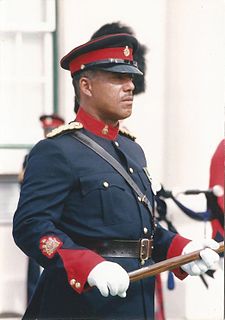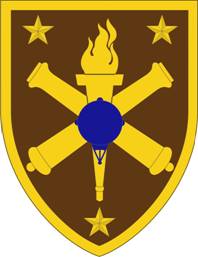
The United States Foreign Intelligence Surveillance Court is a U.S. federal court established and authorized under the Foreign Intelligence Surveillance Act of 1978 (FISA) to oversee requests for surveillance warrants against foreign spies inside the United States by federal law enforcement and intelligence agencies. Such requests are made most often by the National Security Agency (NSA) and the Federal Bureau of Investigation (FBI). Congress created FISA and its court as a result of the recommendations by the U.S. Senate's Church Committee.

The Fourth Amendment to the United States Constitution is part of the Bill of Rights. It prohibits unreasonable searches and seizures. In addition, it sets requirements for issuing warrants: warrants must be issued by a judge or magistrate, justified by probable cause, supported by oath or affirmation, and must particularly describe the place to be searched and the persons or things to be seized.

A warrant officer (WO) is an officer in a military organisation who is designated an officer by a warrant, as distinguished from a commissioned officer who is designated an officer by a commission, and a non-commissioned officer who is designated an officer, often by virtue of seniority.

Alvin Carl Plantinga is an American analytic philosopher who works primarily in the fields of philosophy of religion, epistemology, and logic.
An arrest warrant is a warrant issued by a judge or magistrate on behalf of the state, which authorizes the arrest and detention of an individual, or the search and seizure of an individual's property.

An execution warrant is a writ that authorizes the execution of a judgment of death on an individual. An execution warrant is not to be confused with a "license to kill", which operates like an arrest warrant but with deadly force instead of arrest as the end goal.

In finance, a warrant is a security that entitles the holder to buy the underlying stock of the issuing company at a fixed price called exercise price until the expiry date.
A warrant is generally an order that serves as a specific type of authorization, that is, a writ issued by a competent officer, usually a judge or magistrate, which permits an otherwise illegal act that would violate individual rights and affords the person executing the writ protection from damages if the act is performed.
Abuse of process is a cause of action in tort arising from one party making misusing or perversion of regularly issued court process not justified by the underlying legal action. It is a common law intentional tort. It is to be distinguished from malicious prosecution, another type of tort that involves misuse of the public right of access to the courts.
In the United States Navy, officers have various ranks. Equivalency between services is by pay grade. United States Navy commissioned officer ranks have two distinct sets of rank insignia: On dress uniform a series of stripes similar to Commonwealth naval ranks are worn; on service khaki, working uniforms, and special uniform situations, the rank insignia are similar to the equivalent rank in the US Army or US Air Force.

Warrant is an American glam metal band formed in 1984 in Hollywood, Los Angeles, California, that experienced success from 1989 to 1996 with five albums reaching international sales of over 10 million. The band first came into the national spotlight with their 2× platinum debut album Dirty Rotten Filthy Stinking Rich, and one of its singles, "Heaven," reached No. 1 in Rolling Stone and No. 2 on the Billboard Hot 100. The band continued its success in the early 1990s with the 2× platinum album Cherry Pie which provided the hit album titled song and music video.

Chorąży or khorunzhyi (Polish pronunciation: [xɔˈrɔ̃ʐɨ]; means "Standard bearer"; Russian and Ukrainian: Хорунжий is a military rank in Poland, Ukraine and some neighboring countries. A chorąży was once a knight who bore an ensign — the emblem of an armed troop, a province, a land, a duchy, or the kingdom. This function later evolved into a non-hereditary noble title.
Chimel v. California, 395 U.S. 752 (1969), is a 1969 Supreme Court of the United States case. In Chimel, the Court held that police officers arresting a person at home could not search the entire home without a search warrant, but police may search the area within immediate reach of the person.

In the United States Armed Forces, the ranks of warrant officer are rated as officers above senior non-commissioned officers, candidates, cadets, and midshipmen but subordinate to the officer grade of O‑1. This application differs from the Commonwealth of Nations and other militaries, where warrant officers are the most senior of the other ranks, equivalent to the US Armed Forces grades of E‑8 and E‑9.
Zurcher v. Stanford Daily, 436 U.S. 547 (1978), is a United States Supreme Court case from 1978 in which The Stanford Daily, a student newspaper at Stanford University, was searched by police after they suspected the paper to be in possession of photographs of a demonstration that took place at the university's hospital in April 1971. The Stanford Daily filed a suit claiming that under the protection of the First and Fourth Amendments of the Constitution, the warrants were unconstitutional and that the searches should have fallen under the context of subpoenas. The Supreme Court ruled against The Stanford Daily; however, Congress later passed the Privacy Protection Act of 1980, which provides additional protections against searches and seizures to the press and individuals who disseminate information to the public, unless that individual is suspected of a crime or a life-threatening situation is present.

The United States Army's Warrant Officer Candidate School (WOCS), located at Fort Rucker, Alabama, provides training for Soldiers to become a warrant officer in the U.S. Army or U.S. Army National Guard, with the recent exception of U.S. Army Special Forces Warrant Officers. Since 2007, Special Forces Warrant Officers attend the Special Forces Warrant Officer Technical and Tactical Certification Course (SF-WOTTC) at Fort Bragg, North Carolina. As of January 2018, WOCS and SF-WOTTC are the only two training institutions which are authorized to appoint warrant officers in the U.S. Army. Warrant officer candidates are typically drawn from enlisted members and inter-service transfers. In this case, Inter-Service Transfer refers to enlisted members of the U.S. Air Force, U.S. Coast Guard, U.S. Navy, or U.S. Marine Corps transferring to the U.S. Army to attend WOCS, or civilian high school graduates who enlist for guaranteed attendance as aviation (flight) candidates at WOCS after they complete Basic Combat Training (BCT). Warrant officer candidates without prior enlisted service are informally referred to as high school to flight school or street to seat recruits by warrant officer candidates with prior enlisted service.

The Massachusetts District Court is a trial court in Massachusetts that hears a wide range of criminal, civil, housing, juvenile, mental health, and other types of cases.

Microsoft Corp. v. United States, known on appeal to the U.S. Supreme Court as United States v. Microsoft Corp., was a data privacy case involving the extraterritoriality of law enforcement seeking electronic data under the 1986 Stored Communications Act, Title II of the Electronic Communications Privacy Act of 1986 (ECPA), in light of modern computing and Internet technologies such as data centers and cloud storage.












